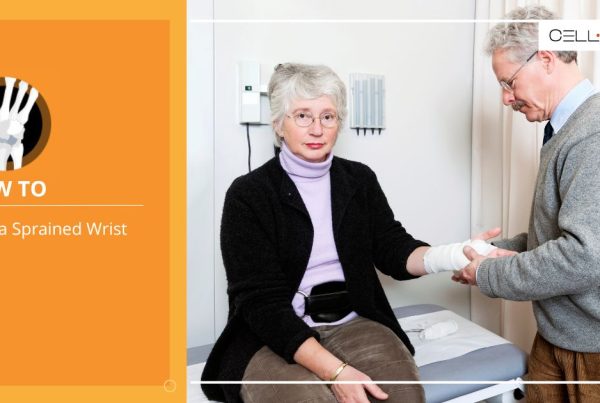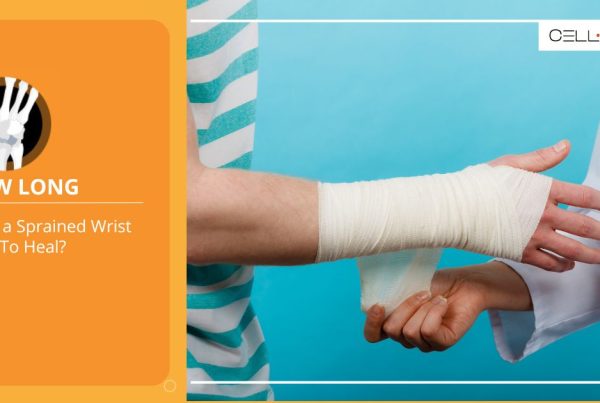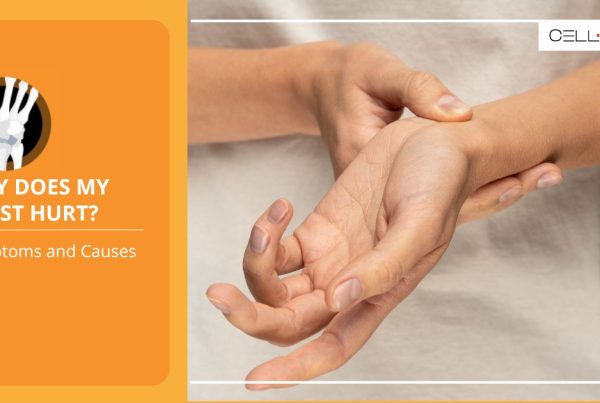Published on: December 10, 2024 | Updated on: January 18, 2025
Wrist pain is one of the most common musculoskeletal disorders, affecting a whopping 10% of the population. Our wrist is a complex joint with eight carpal bones that affect our grip and movement.
Wrist pain presents itself with a combination of symptoms depending on the primary cause. For example, carpal tunnel syndrome of the wrist affects movement, while any problem with the ligament affects the stability of the joint.
Nerve compression, repetitive hand movement, joint dislocation, fracture, strains, sprains, and underlying medical conditions are some other reasons for wrist pain. As numerous people experience wrist pain, you must recognize the symptoms for pain management. If you’re wondering how to relieve wrist pain, some remedies might help.
What Are the Symptoms of Wrist Pain?
The symptoms of wrist pain depend on the underlying cause. Let’s look into the most common symptoms.
- Sudden sharp pain
- Dull aching pain
- Swollen fingers
- Swelling of the wrist
- Weakened grip
- Warmth in the wrist joint
- Pain that radiates to the forearm
- Numbness around the wrist joint
- Difficulty making a fist
- Tingling sensation in the fingers
- Inflammation and redness around the wrist
How to Relieve Wrist Pain? Five Home Remedies
Studies estimate that out of 43% of the people experiencing a musculoskeletal disorder, about 13% have wrist pain. If you haven’t had an injury, the wrist pain likely results from underlying problems.
While most types of wrist pain resolve on their own, a few home remedies might speed up recovery or completely relieve pain.
Here are five home remedies to relieve wrist pain.
1. Apply Cold Compresses
Cold compresses can work wonders for acute wrist pain. Acute pain typically lasts from 7 days up to 30 days.
You can relieve acute wrist pain through cold compresses because they numb the area, which reduces pain and inflammation.
Apply cold compresses for 15-20 minutes every three to four hours to reduce swelling. Once the swelling subsides, it prevents further tissue damage.
2. Wrap the Wrist
Wrist pain may result from sprained ligaments in the joint. Excessive pressure from repetitive movements, injury, or accidents can cause a sprained wrist. You can wrap your wrist to provide support to the ligaments to heal them quickly.
Wrapping the wrist also relieves pain as it compresses the wrist and keeps the ligaments in place, providing more stability. The wrap also relieves excess pressure off the wrist joint, preventing the injury from becoming worse.
3. Use a Cast or Splint
Knowing how to relieve wrist pain from an injury is strategic because keeping a cast on for days may affect movement. Therefore, you should properly assess your condition to know whether a cast or splint would work.
In case of joint instability, you should use a cast or splint. If an injury or trauma has affected the wrist, a cast or splint will keep the wrist in one place, preventing further damage. Keeping your wrist immobile through this method prevents wrist pain.
4. Take Non-prescription Pain Relievers
Ibuprofen and acetaminophen are some non-prescription pain relievers that reduce inflammation and wrist pain.
OTC pain relievers also manage side effects that accompany wrist pain, such as restricted movement, swelling, and muscular tension.
5. Perform Gentle Exercises
Certain wrist exercises can restore mobility and relieve wrist pain. You can slowly bend and straighten your wrist. Also, try side-to-side movements of the hand.
Make a fist and clench it before relieving it. These exercises are gentle on the wrist joint, so they increase flexibility, reducing the pressure on the wrist ligaments and muscles.
In some cases, such as a ligament injury, exercising the wrist joint makes the pain worse. Therefore, it’s best to consult a physical therapist for joint mobilization exercises after you have ruled out the possibility of a ligament injury.
How to Relieve Wrist Pain From Medical Conditions?
Besides a general line of treatment, you should also learn how to relieve wrist pain from medical conditions such as carpal tunnel syndrome, arthritis, etc.
Carpal Tunnel Syndrome
Our wrists have eight carpal bones surrounded by a joint capsule that supports the wrist and stabilizes it. The passage between these bones and the ligaments is called a carpal tunnel. The carpal tunnel houses the median nerve.
About 3-5% of adults in the US have carpal tunnel syndrome, a common workplace injury resulting from repetitive wrist movements.
For example, people who type on the keyboard for hours or perform repetitive tasks such as clicking a mouse are at a higher risk of developing CTS. This occupational problem compresses the median nerve, which causes tingling, numbness, and wrist pain.
Knowing how to relieve wrist pain from CTS includes ergonomic changes, taking breaks between work, considering physical therapy, and using a wrist splint at night.
Non-infectious Arthritis
Non-infectious arthritis causes swelling and inflammation of the wrist joint. You can relieve pain by doing flexibility exercises every day after taking anti-inflammatory medicines.
Make a fish and rotate it in a clockwise direction for 10 seconds before rotating it in the anti-clockwise direction. You can also start with bending and straightening the wrist joint. These low-impact exercises for the wrist joint relieve tension and promote flexibility.
However, you should skip the exercises if they make the wrist pain worse due to inflammation of the joint. In this case, you should first focus on reducing the inflammation through hot and cold therapy.
When to See a Doctor?
While the most common causes of wrist pain resolve on their own or through certain home remedies, it is essential to seek medical attention if the wrist pain keeps getting worse.
If the pain lasts longer than three weeks, you should seek medical attention. First, the doctor will conduct a physical exam and look into the symptoms before devising a treatment strategy.
Upon physical examination, the doctor may ask you for history, where you give an account of a recent fall, accident, injury, or trauma to the wrist.
Next, the doctor may assess the joint’s range of motion. You will be asked to bend the wrist forward and backward, make a fist, grip objects, etc. These movements help analyze the wrist joint’s stability.
After a physical exam and a thorough review of symptoms, the doctor rules out underlying conditions by medical imaging tests such as X-rays, MRIs, and CT scans.
Wrap Up
Wrist pain is quite common due to several causes. The most common are wrist strains and sprains resulting from workplace injuries. Identifying the primary cause is the first step toward recovery.
After evaluating your condition, try home remedies. If the pain persists, you should seek medical attention for a physical exam to diagnose and plan treatment.
Remember that early intervention is key to a faster recovery. Therefore, you should not wait until the pain gets worse. For persistent pain that lasts more than three weeks, immediately consult a doctor for physiotherapy and surgical interventions.
Sources
Footnotes
- Ferguson R, Riley ND, Wijendra A, Thurley N, Carr AJ, Dean BJ. Wrist pain: a systematic review of prevalence and risk factors–what is the role of occupation and activity? BMC Musculoskelet Disord. 2019;20:542.
- Chen N, Li G, Sun X, Zhang M, Zhang H, Ling R, et al. Prevalence status and associated factors of wrist postural injury in the Chinese occupational population. Front Public Health. 2022;10:1047814.
- Chou R, Wagner J, Ahmed AY, et al. Treatments for Acute Pain: A Systematic Review. Comparative Effectiveness Review No. 240. Rockville (MD): Agency for Healthcare Research and Quality (US); 2020.
- Wang Y, Lu H, Li S, Zhang Y, Yan F, Huang Y, et al. Effect of cold and heat therapies on pain relief in patients with delayed onset muscle soreness: A network meta-analysis. J Rehabil Med. 2022;54:331.
- Presazzi A, Bortolotto C, Zacchino M, Madonia L, Draghi F. Carpal tunnel: Normal anatomy, anatomical variants and ultrasound technique. J Ultrasound. 2011 Mar;14(1):40–46.
- Joshi A, Patel K, Mohamed A, Oak S, Zhang MH, Hsiung H, et al. Carpal Tunnel Syndrome: Pathophysiology and Comprehensive Guidelines for Clinical Evaluation and Treatment. Cureus. 2022 Jul;14(7).
- Hemmati S, Ponich B, Lafreniere AS, Genereux O, Rankin B, Elzinga K. Approach to chronic wrist pain in adults. Can Fam Physician. 2024 Jan;70(1):16–23.
References
- Carpal Tunnel Syndrome. Cleveland Clinic. Accessed 09/18/2024.
- Wrist Pain. Mayo Clinic. Accessed 09/18/2024.
- Sprained Wrist Injury. WebMD. Accessed 09/18/2024.
- When to Use a Splint vs. Cast for Bone and Joint Injuries. Verywell Health. Accessed 09/18/2024.
- Pain Management Medications. StatPearls. Accessed 09/18/2024.
- 7 Simple Wrist Strengthening Exercises. Verywell Health. Accessed 09/18/2024.
- Wrist Arthritis. StatPearls. Accessed 09/18/2024.
CELLAXYS does not offer Stem Cell Therapy as a cure for any medical condition. No statements or treatments presented by Cellaxys have been evaluated or approved by the Food and Drug Administration (FDA). This site contains no medical advice. All statements and opinions are provided for educational and informational purposes only.
Dr Pejman Bady
Author
Dr. Pejman Bady began his career over 20 years ago in Family/Emergency Medicine, working in fast-paced emergency departments in Nevada and Kansas. He has served the people of Las Vegas as a physician for over two decades. Throughout this time, he has been met with much acclaim and is now the head of Emergency Medical Services in Nye County, Nevada. More about the doctor on this page.
Dr Pouya Mohajer
Contributor
Pouya Mohajer, M.D. is the Director of Spine and Interventional Medicine for CELLAXYS: Age, Regenerative, and Interventional Medicine Centers. He has over 20 years of experience in pain management, perioperative medicine, and anesthesiology. Dr. Mohajer founded and is the Medical Director of Southern Nevada Pain Specialists and PRIMMED Clinics. He has dedicated his career to surgical innovation and scientific advancement. More about the doctor on this page.









